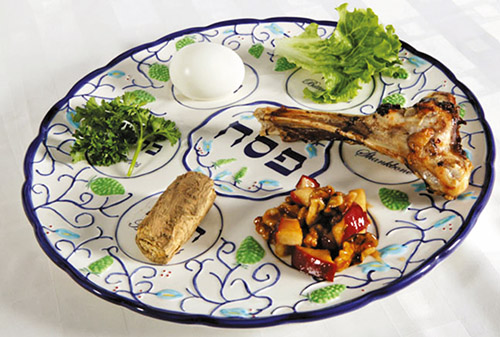
Pesach is a lot of work. You shop, clean, schlep and cook. You exchange recipes and extend invitations. In non-COVID years, you scrounge for cribs for the visiting grandchildren. And there are Pesach workshops (Zoom, this year, of course) for you to attend and Haggadah commentaries to review for possible discussion at the Seder. A lot to do, right?
Yet, by the second day of Pesach, the majority of the reasons for all these efforts seem over. Yes, everyone said they enjoyed being together. Even Uncle Irving. They kvelled during the Mah Nishtanah. The soup and fish were great, the matzot hard, the horseradish hot, and the wine, well, sweet. The talk was OK, but cut short, of course, because everyone was hungry. Two uncles continued the family tradition of singing Dayenu off-key. And everyone is looking forward to doing it again next year.
But after “Next Year in Jerusalem!” you think: “What now? If that’s all there is, whydid the Torah make Pesach a week long?”
My wife’s answer to this perennial question is quite practical. You need the extra time to rest up before you have to put everything away and start all over again. She’s right.
A historian’s response: In ancient times there were many things to do in Jerusalem, including great shopping. Religious and agricultural ceremonies engaged the pilgrims. Remember, they walked a long way up to the big city. Why shouldn’t they spend a few extra days away from the farm? And the historian is right, too.
But I think the original question is off base. It ignores other Pesach events and customs. It especially ignores the truly major culminating event that occurred later in the week of the original Passover, the splitting of Yam Suf, the Reed Sea. [Mnemonic: On the first night, God passed over. On the last day, we passed through.]
Now, that was really something! The rabbis tell us that a maidservant by the sea saw more than even the prophet Ezekiel would later see—and he saw the wonders of Heaven. That says a lot about that moment—and it also suggests that there is much to address in the post-Seder parts of Pesach.
Perhaps, that’s why the Torah reading on the seventh day of Pesach, the anniversary of the event, recounts the miracle… how Pharaoh reneged on his promise and pursued the Jews; how winds separated the sea so that the Israelites could cross on dry land; how the pursuing Egyptians followed and were drowned; and how Moses and Miriam led the people in songs of thanks to God.
A moving commentary about this event describes how the angels in heaven started to sing along with the Jews in praise, but were stopped by Hashem. “How can you sing when my creations are dying?” God stopped the angels, but not the Jews. From this we learn to be compassionate even about our enemies, and at the same time not to be ashamed for being joyful about our miraculous and victorious survival.
Clearly, Pesach is not entirely front-loaded. There’s more to it than just a Seder or two. Let me suggest lessons to consider from just two non-Seder Pesach elements: counting the Omer and the custom of studying Pirkei Avot.
The Torah commands us to count the days and weeks from the second night of Pesach through Shavuot, which commemorates the revelation at Sinai. The lesson is clear. The Exodus was not simply the leaving from Egypt and slavery. It was a going to Sinai and eventually Israel. The counting connects freedom with responsibility … long-term responsibility.
It reminds us that Pesach is not simply a commemoration of a one-time event, but is part of a larger, ongoing process of renewal and growth.
Perhaps that’s also why we are commanded to remember yetziat Mitzrayim, the Exodus from Egypt, every day of the year—not just on its Pesach anniversary.
Another, relatively recent, Pesach custom is to begin studying one of the quintessential statements of Jewish morality and behavior, Pirkei Avot, Ethics of the Fathers. Sephardim study it every Shabbat between Pesach and Shavuot, again underscoring the ethical relationship between freedom and responsibility. Ashkenazim study Pirkei Avot through Rosh Hashanah. This creates further linkages and lessons: Exodus with creation; Hashem as Creator of and Actor in history; and, perhaps, even linking higher human ethical behavior to the Creator’s goal for humanity.
Getting beyond a Seder focus helps us appreciate Pesach’s enduring lessons. Pesach becomes a metaphor for being part of something… with others and within history.
These Pesach-related activities give us the grounding to move forward—and upward. They remind us that we were freed from Egypt not only to go up to a promised land, but to grow up as ethical beings. These laws and customs link us irrevocably to our families, our people, and to all who are or have been denied their dignity as creations of God.
They especially show us that we can and must ask questions and that we should turn to others, especially our families and sages, to find answers.
They also tell us that if we don’t have or understand the answers now, we must be patient, study, count the days, and an answer will come—if we work hard enough to find it. And if it doesn’t seem to come, perhaps, we should find a better way to ask the question or hear the answer.
Simply, a more comprehensive/beyond the Sedarim understanding of Pesach links us to the miracles of Exodus, Creation and Sinai; to Jerusalem, then, now and next year … and to events still to come.
May they all be joyous moments, to be shared with family, friends and all Israel. In Jerusalem.
Chaim Lauer is a Jewish educator and communal professional, author and speaker, known for his programmatic creativity and teaching skills. For over 50 years he has served the Jewish community in various professional capacities, leading Federations, Boards of Jewish Education, and consulting with other national and local organizations.













